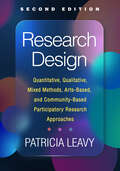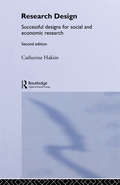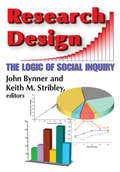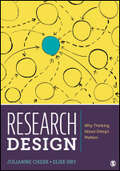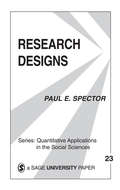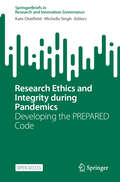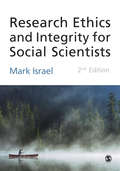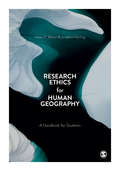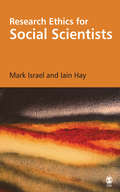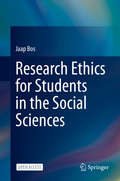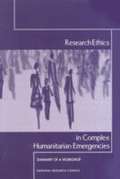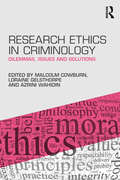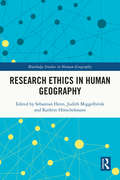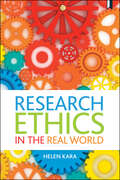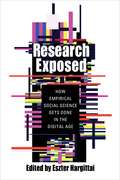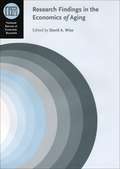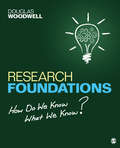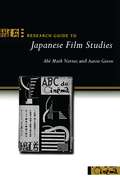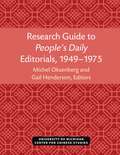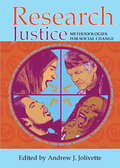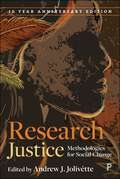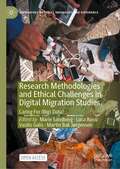- Table View
- List View
Research Design: Quantitative, Qualitative, Mixed Methods, Arts-Based, and Community-Based Participatory Research Approaches
by Patricia LeavyWith a new chapter on the literature review, this accessible step-by-step guide to using the five major approaches to research design is now in a thoroughly revised second edition. The prior edition's user-friendly features are augmented by a new companion website with worksheets keyed to each chapter. For each approach, the text presents a template for a research proposal and explains how to conceptualize and fill in every section. Interdisciplinary research examples draw on current events and social justice issues. Unique coverage includes hot topics--replication studies, data sharing, and preregistration; tailoring proposals to different audiences; and more. Terminology commonly used in each approach is identified and key moments of ethical decision making are flagged. The book includes a general introduction to social research, an in-depth discussion of ethics, and a chapter on how to begin a research study. New to This Edition *New or expanded discussions of theory and literature in quantitative research, replication studies, preregistration of research, the critical paradigm in qualitative research, mixed methods research, approaching different kinds of organizations in community-based participatory research, and more. *Chapter on the literature review, including the ethics of citational practices. *Companion website with worksheets to aid in learning and practicing each chapter's key concepts. *Updated examples, references, and recommended readings throughout. Pedagogical Features *Multiple "Review Stops" in each chapter--quick quizzes with answer keys. *End-of-chapter writing exercises, research activities, and suggested resources. *Bolded key terms and an end-of-book glossary. *Boxed tips from experts in the respective approaches. *Pointers to downloadable worksheets throughout the chapters. *Author-created PowerPoints and chapter tests with answer keys available to instructors using the book in a course.
Research Design: Succesful Designs for Social Economics Research (Contemporary Social Research Ser. #Vol. 13)
by Catherine HakimProviding a practical overview for graduates and professional researchers, this book highlights the central issues involved in the design of medium to large scale social and economic research. Covering both theoretical and policy research Hakim sets out the key features, strengths and limitations of eight main types of study, with illustrations from real life research of the kinds of questions each can best be used to answer. This book also offers a more general pragmatic discussion of strategies for choosing between one design and another, and on how different types of study can be successfully combined in wider ranging research programmes. In this expanded second edition the author has added new material on areas of contemporary significance across the social and economic sciences. New features to this edition are:* a chapter on cross-national comparative studies* more examples throughout the text of comparative research both within Europe and across modern societies* discussions of student theses, advocacy research, selection effects and collaboration.
Research Design: The Logic of Social Inquiry
by Marjo HoefnagelsResearch Design: The Logic of Social Inquiry is a collection of critical writings on different aspects of social research. They have been carefully selected for the variety of approaches they display in relation to three broad styles of research: experimental, survey, and ethnographic. All are classic contributions to the development of methodology and excellent expositions of particular procedures.The book is organized in sections that detail the methods of a typical experimental research program design, data collection, and data analysis. These five sections include The Language of Social Research, Research Design, Data Collection, Measurement, and Data Analysis and Report. Each is preceded by an introduction stressing the unique strengths of the different viewpoints represented and reconciling them in one coherent approach to research.The volume includes displays of philosophical underpinnings of different methodological styles and important issues in research design. Data collection methods, particularly the problem of systematic bias in the data collected, and ways in which researchers may attempt to reduce it, are discussed. There is also a discussion on measurement in which the central issues of reliability, validity, and scale construction are detailed. This kind of synthesis, between such diverse schools of research as the experimentalists and the ethnographers, is of particular concern to social researchers. The book will be of great value to planners and researchers in local government and education departments and to all others engaged in social science or educational research.
Research Design: Why Thinking About Design Matters (The\qualitative Inquiry: Critical Ethics, Justice And Activismseries Is A Collection Designed To Provide A Cross-disciplinary Overview Of The Use Of Qualitative Research As An Avenue For Justice And Critical Transformative Activism/action Socially, Environmentally, And Related To More-than-human/human Entanglements. Much Of This Work Has Been/is Labeled Critical Qualitative Research. Scholarship T #5)
by Julianne Cheek Elise ∅byDesigning research is about making decisions to transform an idea into a plan that can provide answers to a research problem or question. Thinking about, and then making these decisions results in the research design – the plan that will be followed to conduct the research and answer the question. This text engages in a dialogue with the reader, providing a serious but accessible introduction to research design, for use as a guide when designing your own research or when reading the research of others. Julianne Cheek and Elise Øby show that designing research is an iterative and reflexive process in which there is constant thinking through, and re-visiting of, decisions about that design as it develops. They use a variety of pedagogical devices throughout the book including Tip; Activity; and Putting it into Practice boxes to emphasize specific points and encourage readers to think about the practical implications of what they have learned.
Research Design: Why Thinking About Design Matters (The\qualitative Inquiry: Critical Ethics, Justice And Activismseries Is A Collection Designed To Provide A Cross-disciplinary Overview Of The Use Of Qualitative Research As An Avenue For Justice And Critical Transformative Activism/action Socially, Environmentally, And Related To More-than-human/human Entanglements. Much Of This Work Has Been/is Labeled Critical Qualitative Research. Scholarship T #5)
by Julianne Cheek Elise ∅byDesigning research is about making decisions to transform an idea into a plan that can provide answers to a research problem or question. Thinking about, and then making these decisions results in the research design – the plan that will be followed to conduct the research and answer the question. This text engages in a dialogue with the reader, providing a serious but accessible introduction to research design, for use as a guide when designing your own research or when reading the research of others. Julianne Cheek and Elise Øby show that designing research is an iterative and reflexive process in which there is constant thinking through, and re-visiting of, decisions about that design as it develops. They use a variety of pedagogical devices throughout the book including Tip; Activity; and Putting it into Practice boxes to emphasize specific points and encourage readers to think about the practical implications of what they have learned.
Research Designs
by Paul E. SpectorResearch Designs is a clear, compact introduction to the principles of experimental and non-experimental design especially written for social scientists and their students. Spector covers major designs including: single group designs; pre-test/post-test designs; factorial designs, hierarchical designs; multivariate designs; the Solomon four group design; panel designs; and designs with concomitant variables.
Research Ethics and Integrity During Pandemics: Developing the PREPARED Code (SpringerBriefs in Research and Innovation Governance)
by Kate Chatfield Michelle SinghThis open-access book is an essential read for anyone interested in pandemic preparedness, research governance, and the ethical oversight of research. It examines the development of a pioneering research ethics framework designed for use during pandemics, guiding readers through the careful development of the PREPARED Code, while highlighting the key steps and lessons learned. The book also underscores the importance of supportive measures, such as user-friendly ethics training, to ensure effective implementation. Drawing from these insights, it offers recommendations for others seeking to develop their own clear, engaging, and accessible ethics code.
Research Ethics and Integrity for Social Scientists: Beyond Regulatory Compliance
by Mark IsraelEthics and integrity in research are increasingly important for social scientists around the world. We are tackling more complex problems in the face of expanding and not always sympathetic regulation. This book surveys the recent developments and debates around researching ethically and with integrity and complying with ethical requirements. The new edition pushes beyond the work of the first edition through updated and extended coverage of issues relating to international, indigenous, interdisciplinary and internet research. Through case studies and examples drawn from all continents and from across the social science disciplines, the book: demonstrates the practical value of thinking seriously and systematically about ethical conduct in social science research identifies how and why current regulatory regimes have emerged reveals those practices that have contributed to the adversarial relationships between researchers and regulators encourages all parties to develop shared solutions to ethical and regulatory problems.
Research Ethics and Integrity for Social Scientists: Beyond Regulatory Compliance
by Mark IsraelEthics and integrity in research are increasingly important for social scientists around the world. We are tackling more complex problems in the face of expanding and not always sympathetic regulation. This book surveys the recent developments and debates around researching ethically and with integrity and complying with ethical requirements. The new edition pushes beyond the work of the first edition through updated and extended coverage of issues relating to international, indigenous, interdisciplinary and internet research. Through case studies and examples drawn from all continents and from across the social science disciplines, the book: demonstrates the practical value of thinking seriously and systematically about ethical conduct in social science research identifies how and why current regulatory regimes have emerged reveals those practices that have contributed to the adversarial relationships between researchers and regulators encourages all parties to develop shared solutions to ethical and regulatory problems.
Research Ethics for Human Geography: A Handbook for Students
by Jonathan Darling Helen F. WilsonResearch Ethics for Human Geography is a lively and engaging introduction to key ethical issues in geographical research by leading figures in the discipline. It addresses the wide range of ethical issues involved in collecting, analysing and writing up research across the social sciences, and explores and explains the more specific ethical issues associated with different forms of geographical inquiry. Each chapter comprises detailed summaries and definitions, real-life case studies, student check-lists and annotated recommendations for reading, making the book a valuable toolkit for students undertaking all forms of geographical research, from local and overseas fieldwork, through to dissertation research, methods-training, and further research.
Research Ethics for Human Geography: A Handbook for Students
by Jonathan Darling Helen F. WilsonResearch Ethics for Human Geography is a lively and engaging introduction to key ethical issues in geographical research by leading figures in the discipline. It addresses the wide range of ethical issues involved in collecting, analysing and writing up research across the social sciences, and explores and explains the more specific ethical issues associated with different forms of geographical inquiry. Each chapter comprises detailed summaries and definitions, real-life case studies, student check-lists and annotated recommendations for reading, making the book a valuable toolkit for students undertaking all forms of geographical research, from local and overseas fieldwork, through to dissertation research, methods-training, and further research.
Research Ethics for Social Scientists
by Iain Hay Mark Israel`This is an excellent book which can be recommended both to the professional ethicist seeking to situate research ethics for a social scientific audience and to social scientists seeking an overview of the current ethical landscape of their discipline' - Research Ethics Review Ethics is becoming an increasingly prominent issue for all researchers across the western world. This comprehensive and accessible guide introduces students to the field and encourages knowledge of research ethics in practice. Research Ethics for Social Scientists sets out to do four things: The first is to demonstrate the practical value of thinking seriously and systematically about what constitutes ethical conduct in social science research. Secondly, the text identifies how and why current regulatory regimes have emerged. Thirdly, it seeks to reveal those practices that have contributed to the adversarial relationships between researchers and regulators. Finally, the book hopes to encourage both parties to develop shared solutions to ethical and regulatory problems. Research Ethics for Social Scientists is an excellent introductory text for students as it: - introduces students to ethical theory and philosophy; - provides practical guidance on what ethical theory means for research practice; - provides case studies to give real examples of ethics in research action. The result is an informative, accessible and practical guide to research ethics for any student or researcher in the social sciences.
Research Ethics for Students in the Social Sciences
by Jaap BosThis open access textbook offers a practical guide into research ethics for undergraduate students in the social sciences. A step-by-step approach of the most viable issues, in-depth discussions of case histories and a variety of didactical tools will aid the student to grasp the issues at hand and help him or her develop strategies to deal with them. This book addresses problems and questions that any bachelor student in the social sciences should be aware of, including plagiarism, data fabrication and other types of fraud, data augmentation, various forms of research bias, but also peer pressure, issues with confidentiality and questions regarding conflicts of interest. Cheating, ‘free riding’, and broader issues that relate to the place of the social sciences in society are also included. The book concludes with a step-by-step approach designed to coach a student through a research application process.
Research Ethics in Complex Humanitarian Emergencies: SUMMARY OF A WORKSHOP
by Holly ReedA summary of Research Ethics in Complex Humanitarian Emergencies
Research Ethics in Criminology: Dilemmas, Issues and Solutions
by Azrini Wahidin Loraine Gelsthorpe Malcolm CowburnEthical principles and concerns are at the heart of criminological research and can arise at the planning, implementation and reporting stages. It is vital that researchers are aware of the issues involved so that they can make informed decisions about the implications of certain choices. This cutting-edge book charts the changing topography of ethics, governance and accountability for social science research in criminology, contributes to the developing discourse on research ethics and demonstrates the importance as to why research ethics should be taken seriously. Bringing together a range of experts who consider both quantitative and qualitative methodologies. This book examines the key issues and challenges of ethical research. Topics covered include: the measures in place to ensure ethical research practice for social scientists; the relationship between state funding and research findings; the challenge of researching sensitive areas; the changing face of governance and accountability for academic criminology. Research Ethics in Criminology is a comprehensive and accessible text that is ideal for students studying criminological research methods. Supplementary material includes key points, chapter summaries, critical thinking questions, key definitions, case examples, and recommendations for further reading. This book will provide a thorough grounding in the ethical issues faced by researchers, as well as an understanding of the role and purpose of ethics committees.
Research Ethics in Human Geography (Routledge Studies in Human Geography)
by Kathrin Hörschelmann Judith Miggelbrink Sebastian HennThis book explores common ethical issues faced by human geographers in their research. It offers practical guidance for research planning and design that incorporates geographic disciplinary knowledge to conceptualise research ethics. The volume brings together international insights from researchers in geography and related fields to provide a comprehensive overview of relevant ethical frameworks and challenges in human geography research. It includes in-depth reflections on a range of ethical dilemmas that arise in certain contextual conditions and spatial constructions that face those researching and teaching on spatial dimensions of social life. With a focus on the increased need for specialist ethics training as part of postgraduate education in the Humanities and Social Sciences and the necessity for fostering sensitivity in cross-cultural comparative research, the book seeks to enable people to engage in ethical decision-making and moral reasoning while conducting research. Chapters examine the implications of geographical research for conceptualising ethics and discuss specific case studies from which more general conclusions, linked to conceptual debates, are drawn. As a research-based reference guide for tackling ethically sensitive projects and international differences in legal and institutional standards and requirements, the book is useful for postgraduate and undergraduate students as well as academics teaching at senior levels.
Research Ethics in the Real World: Euro-Western and Indigenous Perspectives
by Helen KaraResearch ethics and integrity are growing in importance as academics face increasing pressure to win grants and publish, and universities promote themselves in the competitive HE market. Research Ethics in the Real World is the first book to highlight the links between research ethics and individual, social, professional, institutional, and political ethics. Drawing on Indigenous and Euro-Western research traditions, Helen Kara considers all stages of the research process, from the formulation of a research question to aftercare for participants, data and findings. She argues that knowledge of both ethical approaches is helpful for researchers working in either paradigm. Students, academics, and research ethics experts from around the world contribute real-world perspectives on navigating and managing ethics in practice. Research Ethics in the Real World provides guidance for quantitative, qualitative, and mixed-methods researchers from all disciplines about how to act ethically throughout your research work. This book is invaluable in supporting teachers of research ethics to design and deliver effective courses.
Research Exposed: How Empirical Social Science Gets Done in the Digital Age
by Eszter HargittaiThe era of digital communication provides endless opportunities for the collection and analysis of social data in novel ways. It also presents new and unanticipated challenges, as researchers are often inventing elements of their methodologies on the fly or studying a phenomenon or media platform for the first time.Research Exposed offers in-depth, behind-the-scenes accounts of doing empirical social science in this new paradigm. Through firsthand descriptions of innovative research projects, it shares lessons learned from over a dozen scholars’ cutting-edge work. These candid accounts describe what can go wrong when pioneering new genres of research and how such difficulties can be overcome, giving both big-picture reflection and actionable advice. The chapters discuss a variety of methods, ranging from the completely novel to the use of more traditional approaches in the digital context, and cover research questions relevant to a range of disciplines, including sociology, political science, communication, information studies, and anthropology.By focusing attention on the concrete details seldom discussed in final project write-ups or traditional research guides, Research Exposed helps equip junior and senior scholars alike with essential information that is all too often left with no outlet for sharing. It offers important insights into how empirical social science research can be both innovative and rigorous when dealing with the opportunities and challenges presented by digital media.
Research Findings in the Economics of Aging
by David A. WiseThe social and economic effects of this shift are significant, and in Research Findings in the Economics of Aging, a group of leading researchers takes an eclectic view of the subject. Among the broad topics discussed are work and retirement behavior, disability, and their relationship to the structure of retirement and disability policies.
Research Foundations: How Do We Know What We Know?
by Douglas R. WoodwellDesigning research can be daunting and disorienting for novices. After experiencing this first hand, author Douglas Woodwell has written Research Foundations: How Do We Know What We Know?,a book that shows how to mentally frame research in a way that is understandable and approachable while also discussing some of the more specific issues that will aid the reader in understanding the options available. Stressing the link between research and theory-building, this concise book shows students how new knowledge is discovered through the process of research. The author presents a model that ties together research processes across the various traditions and shows how different types of research interrelate. The book is sophisticated in its presentation, but uses plain language to provide an explanation of higher-level concepts in an engaging manner. Throughout the book, the author treats research methodologies as a blueprint for answering a wide range of interesting questions, rather than simply a set of tools to be applied. The book is an excellent guide for students who will be consumers of research and who need to understand how theory and research interrelate.
Research Guide to Japanese Film Studies
by Aaron Gerow Abé Markus NornesMichigan Monograph Series in Japanese Studies No. 65 The Research Guide to Japanese Film Studies provides a snapshot of all the archival and bibliographic resources available to students and scholars of Japanese cinema. Among the nations of the world, Japan has enjoyed an impressively lively print culture related to cinema. The first film books and periodicals appeared shortly after the birth of cinema, proliferating wildly in the 1910s with only the slightest pause in the dark days of World War II. The numbers of publications match the enormous scale of film production, but with the lack of support for film studies in Japan, much of it remains as uncharted territory, with few maps to negotiate the maze of material. This book is the first all-embracing guide ever published for approaching the complex archive for Japanese cinema. It lists all the libraries and film archives in the world with significant collections of film prints, still photographs, archival records, books, and periodicals. It provides a comprehensive, annotated bibliography of the core books and magazines for the field. And it supplies hints for how to find and access materials for any research project. Above and beyond that, Nornes and Gerow's Research Guide to Japanese Film Studies constitutes a comprehensive overview of the impressive dimensions and depth of the print culture surrounding Japanese film, and a guideline for future research in the field. This is an essential book for anyone seriously thinking about Japan and its cinema.
Research Guide to People’s Daily Editorials, 1949–1975
by Michel Oksenberg Gail HendersonAn indispensable aid to researching a crucial series of policy statements, the present guide provides access to the only continuous source from China which illuminates high-level policy. Includes an extensive subject index.
Research Justice: Methodologies for Social Change
by Andrew J. JolivétteResearch Justice (RJ) is a strategic framework and methodological intervention that seeks to transform structural inequities in research. Research Justice: Methodologies for Social Change builds upon the methodological frameworks developed by the national non-profit organization, DataCenter Research for Justice and is the first book to take a radical approach to socially just, community centred research. Challenging traditional models for conducting social science research within marginalized populations, it examines the relationships and intersections between research, knowledge construction, and political power/legitimacy in society. Presenting a new and highly innovative concept of Collective Ceremonial Research Responsiveness, it envisions equal political power and legitimacy for different forms of knowledge including the cultural, spiritual and experiential. The book examines how the co-existence of these various forms of knowledge can lead to greater equality in public policies and laws that rely on data and research to produce social change. Offering a much-needed analysis of the intersections between Research Methods, Public Policy, Cultural Studies, Anthropology, and Sociology, this unique book will be of wide interest to researchers and students in a variety of disciplines
Research Justice: Methodologies for Social Change
by Andrew J. JolivétteBuilding on the pioneering radical approach of Research Justice: Methodologies for Social Change—a seminal text born out of the innovative work of the DataCenter: Research for Justice—this updated edition explores the nexus of research, power, and legitimacy, advocating for equitable knowledge construction. Challenging traditional models, internationally recognized author Andrew J. Jolivétte offers a much-needed analysis of the intersections between Research Methods, Public Policy, Cultural Studies, Anthropology, Ethnic Studies, and Sociology. Complete with a new introductory chapter, the book champions diverse forms of knowledge, envisioning a future where cultural, spiritual, and experiential insights have equal impact on policy making. Interdisciplinary and thought-provoking, this is a vital resource for scholars and students alike.
Research Methodologies and Ethical Challenges in Digital Migration Studies: Caring For (Big) Data? (Approaches to Social Inequality and Difference)
by Luca Rossi Martin Bak Jørgensen Marie Sandberg Vasilis GalisThis Open Access book investigates the methodological and ethical dilemmas involved when working with digital technologies and large-scale datasets in relation to ethnographic studies of digital migration practices and trajectories. Digital technologies reshape not only every phase of the migration process itself (by providing new ways to access, to share and preserve relevant information) but also the activities of other actors, from solidarity networks to border control agencies. In doing so, digital technologies create a whole new set of ethical and methodological challenges for migration studies: from data access to data interpretation, privacy protection, and research ethics more generally. Of specific concern are the aspects of digital migration researchers accessing digital platforms used by migrants, who are subject to precarious and insecure life circumstances, lack recognised papers and are in danger of being rejected and deported. Thus, the authors call for new modes of caring for (big) data when researching migrants’ digital practices in the configuration of migration and borders. Besides taking proper care of research participants’ privacy, autonomy, and security, this also spans carefully establishing analytically sustainable environments for the respective data sets. In doing so, the book argues that it is essential to carefully reflect on researchers’ own positioning as being part of the challenge they seek to address.
